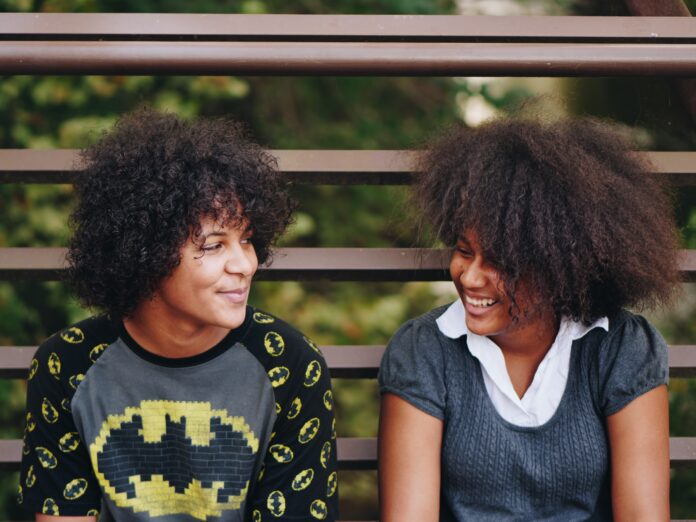
Courage California Statewide Youth Poll
Courage California partnered with Data for Social Good, Communities for a New California, and Inland Empire United to conduct a statewide youth poll of over 2,300 registered voters between the ages of 18-29. The poll has higher representation of Asian (15%), Black (9%), and Latinx (30%) youth, as well as from the Central Valley (18%), Inland Empire (13%), and San Diego (13%). Youth voters from Los Angeles (27%) and the San Francisco Bay Area (15%) were also well-represented.
According to the poll, today’s youth voters are employed full-time (40%) or students (24%), living paycheck to paycheck (37%) or close to (21%), the majority (58%) of them have moved home to live with their parents/family to save money, and over half (56%) have not voted before.
More youth voters identify as liberals.
Democrats have an overall voter registration advantage in the state, and our poll suggests that youth voters are more liberal than the general population of registered voters in California. Nearly half of youth voters (44%) identified their political views as “Very liberal” or “somewhat liberal,” compared to 21% who identified as “Moderate,” 14% as “Very conservative” or “Somewhat conservative,” and 21% who do not think of themselves in these terms.
Most youth voters believe that voting is the best way to change society for the better and that their votes matter.
Voting is a critical means for youth civic engagement. Most youth voters (68%) think that voting is the best way to change society for the better, followed by volunteering (54%) and advocating for a policy (53%). Additionally, 63% of voters think their vote matters, 24% do not, and 14% are uncertain.
The majority of youth voters are planning to vote in the recall election, with greater uncertainty among voters of color.
Voter motivation and turnout will be key to the recall election. Among youth voters, 43% are interested in the recall, 23% are not interested, 22% are neutral, and 11% do not know there is a recall election. At present, 59% of youth voters are planning on voting in the September 14 gubernatorial election, 11% are not, and 30% don’t know. Interest in the recall varies by race, with 38% of Asian, 36% of Black, and 32% of Latinx youth voters not knowing if they will vote in the recall.
Youth voters — and especially Black youth voters — are more in favor of keeping Governor Newsom in office, and there is a significant opportunity for persuasion of undecided voters.
If the recall were held today, 43% of youth voters would vote no on the recall, 26% would vote yes, and 32% don’t know. Support for Governor Newsom is strongest among Black youth voters, 50%, while support for the recall is strongest among Other, 42%, and white, 29%, youth voters.
Looking only at voters who are planning on voting in the recall election, the results show a slightly greater preference, 45%, for keeping Governor Newsom in office, though those willing to remove him also increases significantly among likely voters to 36%, with only 19% of likely voters uncertain on how they will vote.
Youth voters are split on how they think Governor Newsom is handling his job as Governor and in handling the coronavirus pandemic in California.
On the question of if they approve or disapprove of the way Gavin Newsom is handling his job as Governor of California, 41% approve, 39% disapprove, 20% have no opinion. When asked to rate the job Governor Newsom is doing in handling the coronavirus pandemic in the state, 34% rated his job as excellent or good, 30% poor or very poor, 27% fair, and 10% have no opinion.
The environment is the key issue for youth because they are worried about climate change.
The top issues that youth voters care about are the environment (21%), jobs and the economy (15%), housing (12%), and state vaccination rollout/COVID-19 prevention (12%). Of those who chose state vaccination rollout/COVID-19 prevention, 43% did because not everyone in their community is vaccinated, and 40% because it continues to impact their community.
Community leaders are seen as the most effective change agents by youth voters, while these voters also see multiple barriers to change.
Our poll found that 34% youth leaders see community leaders as the most effective change agents, followed closely by elected officials, 31%. There was much less belief in influencers (10%), business people (10%), and celebrities (7%) as effective change agents.
Youth voters are fairly split on who they see as the biggest barrier to change, between government/government gridlock (25%), political party establishments (23%), corporations (20%), and the wealthy (19%). Only 12% saw older generations as the biggest barrier to change.
The majority of youth voters trust their own online research for information, and they most frequently use YouTube and Instagram.
Youth voters rank online research as the most trustworthy source for information (60% of first ranked choices), with print/radio/TV/podcast considered the next most trustworthy source, (13% of first and 28% of second ranked choices). Church/mosque/temple members are considered the least trustworthy source of information, with 47% of last ranked choices. YouTube and Instagram are the most popular platforms of youth voters, with 21% using YouTube daily, 19% Instagram, 12% Facebook, 12% Snapchat, 10% Twitter, and 9% Tik Tok.
About this poll: Data for Social Good conducted the poll for Courage California, Communities for a New California, and IE United from July 19 – August 1, 2021. The poll was administered online in English. We polled 2,343 registered youth aged 18-29, intentionally oversampling from geographic and demographic communities that have seen higher rates of growth in the last decade, including youth voters of color and in the Central Valley, San Diego County, and Inland Empire. The margin of error is +/- 2%. This is the first of a series of statewide youth polls.


